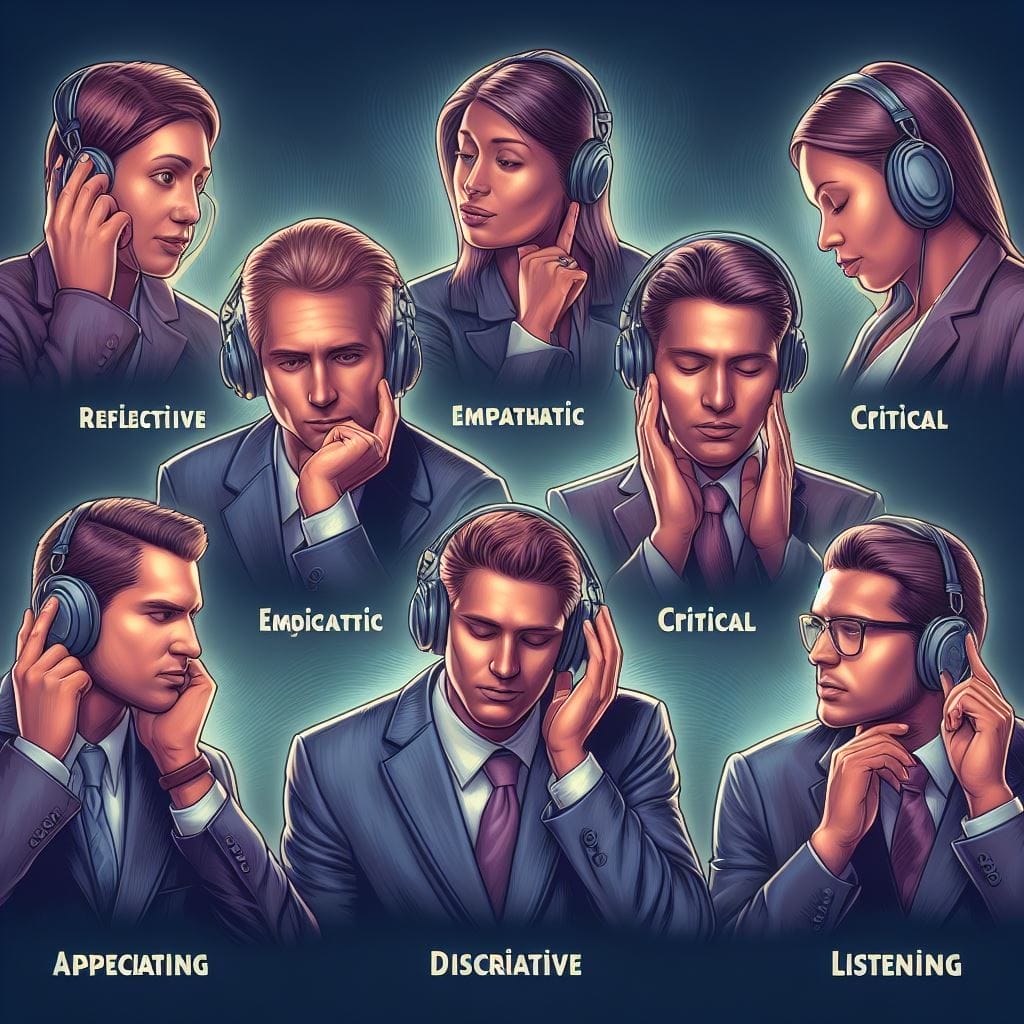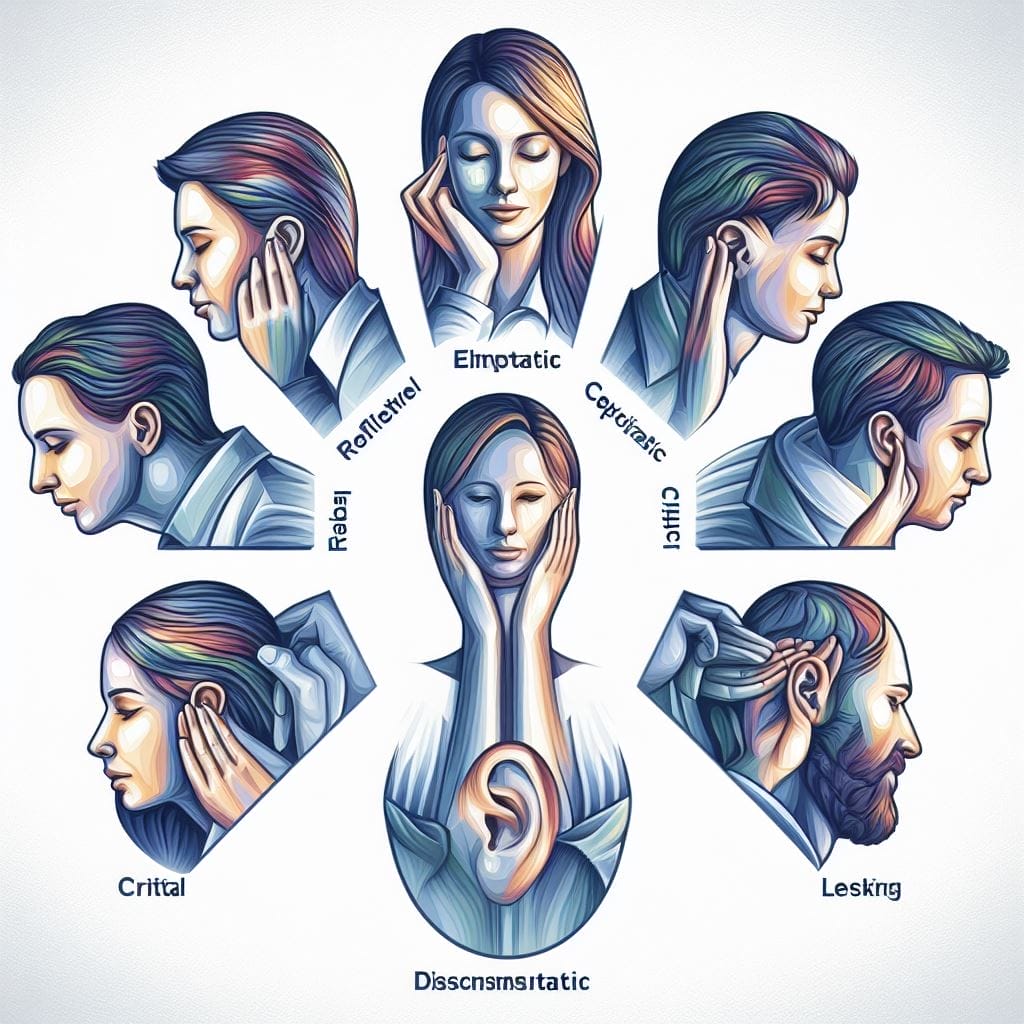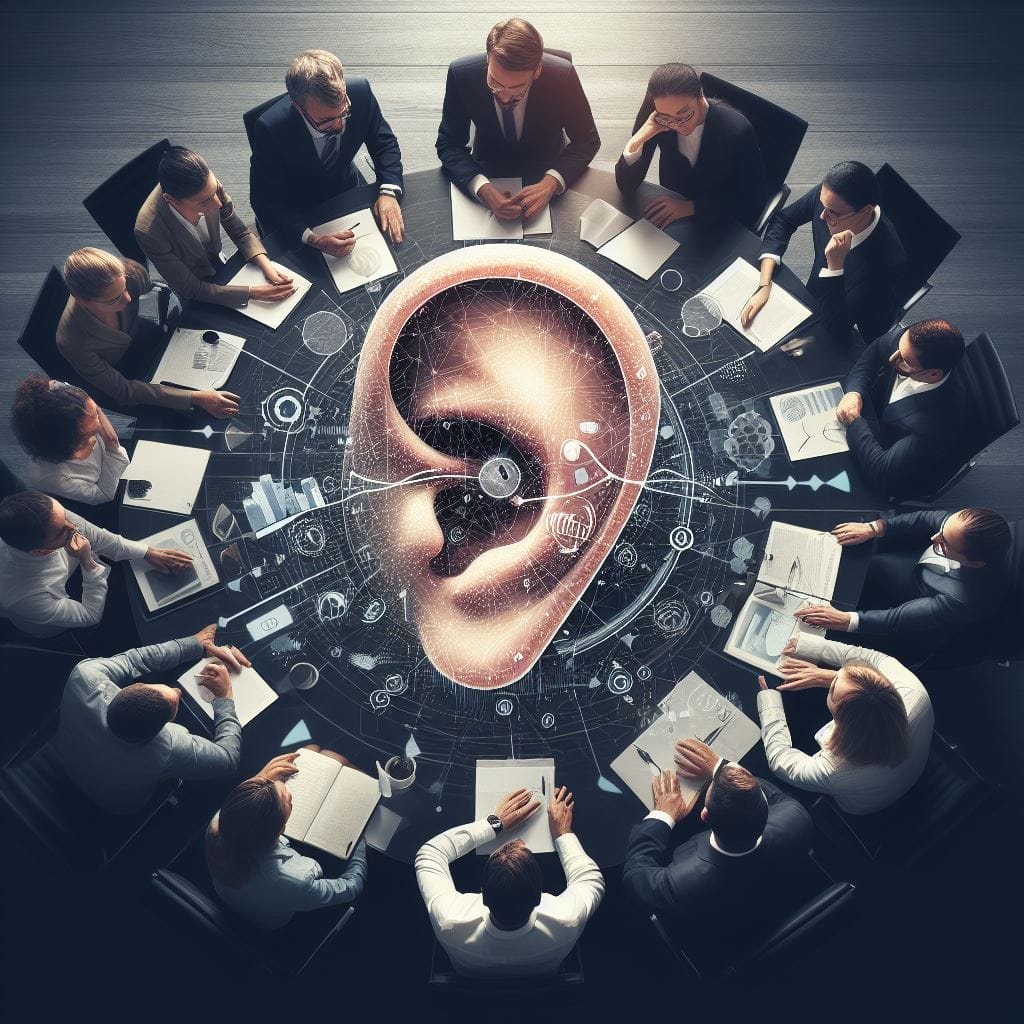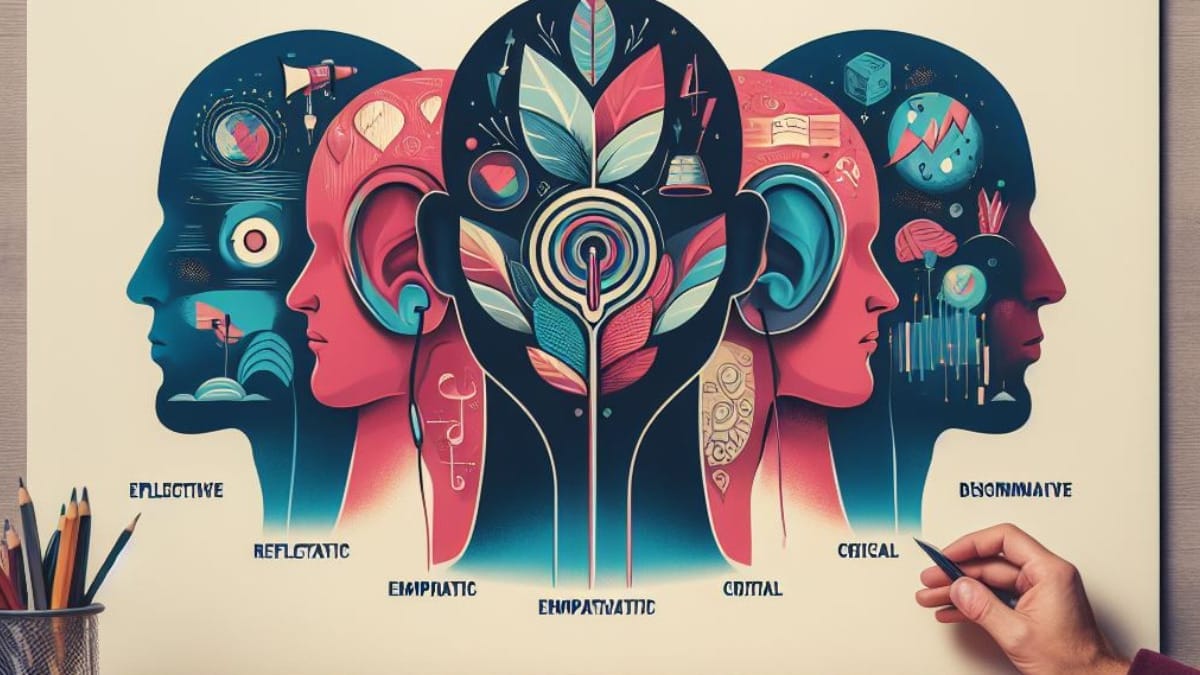Introduction
In a global where communique reigns perfectly, the artwork of active listening stands as a beacon of connection. It’s the key to unlocking the treasure chest of effective communique abilities, allowing the listener to not just hear phrases but truly talk to a profound degree.
But what is an active listener, and why does their prowess in listening skills matter so much?
Imagine a scenario: two individuals engaged in a conversation. An attentive listener is perceptive not just to what is spoken out loud but also to the underlying emotions and minute details of body language. When they listen, they want to comprehend, make sense of, summarize, and close the gap between words and meaning. However, the second person frequently interrupts—possibly without realizing it—which causes misunderstandings and a communication breakdown.
The difference between these two scenarios lies in the magic of active listening. It’s the skill that transforms ordinary conversations into meaningful exchanges, where non-verbal cues are as vital as words, where clarification replaces confusion, and where the true essence of the message is unearthed.
We will go further into the field of active listening in the parts that follow, learning about its many applications and how it may completely transform communication. We’ll discuss the importance of listening skills and how developing active listening abilities may improve your relationships both personally and professionally. Come along on this trip with us as we discover the secrets of successful and meaningful communication, starting with the power of active listening.
Key Takeaway
After journeying through our blog on mastering the art of active listening, you will emerge with a profound understanding of this invaluable skill and its transformative potential. Here’s what you can expect to gain:
- Enhanced Communication Skills: By turning into an active listener, you’ll empower yourself to speak more correctly. You’ll discover ways to decipher not only most effective the phrases but also the unstated messages, main to richer and extra meaningful conversations.
- Improved Relationships: Active listening is the cornerstone of building and nurturing personal and expert relationships. You’ll find out how this skill can foster belief, empathy, and connection, making your interactions more fulfilling.
- Problem-Solving Abilities: Through crucial listening, you’ll broaden the capacity to investigate, compare, and clear up complicated issues, each at work and for your non-public lifestyles.
- Reduced Misunderstandings: Say goodbye to miscommunications and misunderstandings. Our blog will equip you with techniques to make clear and paraphrase correctly, making sure that your message is acquired as supposed.
- Empowered Self-Development: The journey of energetic listening is likewise a journey of self-improvement. You’ll benefit from insights into your very own listening behavior and the gear to become a more proficient communicator.
In a world in which the ability to connect to others is paramount, the artwork of active listening is your secret weapon. After analyzing our blog, you’ll no longer best apprehend its significance but additionally possess the expertise and talents to use it in your everyday life, unlocking doorways to extra meaningful relationships and effective verbal exchange.

Types of Active Listening
A. Reflective Audience: The Understanding Mirror
Reflective listening is described as a form of listening in which the objective is to recognize the speaker’s message with the aid of wondering lower back on what they’ve stated. It’s an effective tool for validating the ideas and emotions of others.
How Reflective Listening Enhances Understanding
Reflective listening is going beyond merely hearing words; it specializes in grasping the underlying feelings and sentiments. By reflecting returned the speaker’s words and feelings, you create an environment of trust and empathy. This approach now not only aids in comprehension but also makes the speaker feel valued and heard. In essence, it complements knowledge with the aid of:
- Validating Emotions: Reflective listening acknowledges the feelings the speaker is conveying, fostering a secure location for open conversation.
- Avoiding Misunderstandings: By restating and elaborating on the speaker’s comments, you can aid in avoiding misunderstandings.
- Strengthening Bonds: When humans sense understanding, it deepens the connection and trust in a courting.
Real-Life Scenarios Demonstrating Its Effectiveness
To respect the power of reflective listening, let’s discover some real-existence situations wherein this approach has been verified useful:
- Conflict Resolution: In heated arguments, reflective listening can de-amplify the scenario. When each event feels heard and understood, locating a commonplace floor becomes more feasible.
- Therapeutic Relationships: Therapists regularly use reflective paying attention to create a secure environment for their customers to explicit themselves. This method helps clients discover their feelings and thoughts greater effectively.
Benefits of Reflective Listening
| Benefits of Reflective Listening |
|---|
| 1. Enhanced Empathy: Reflective listening deepens your know-how of the opposite person’s emotions, supporting you join on a greater profound degree. |
| 2. Encourages Open Dialogue: It creates a safe area for open and sincere conversations, as human beings experience heard and revered. |
| 3. Reduces Conflicts: By acknowledging and validating the opposite individual’s emotions, reflective listening can de-amplify tense conditions. |
| 4. Fosters Trust and Connection: When people realize they can speak in confidence to you and be genuinely understood, agree with you, and more potent bonds are formed. |
Reflective listening isn’t only a communique method; it’s an effective tool for building significant relationships. 🤝💬✨
B. Empathetic Listening: Understanding Emotions Beyond Words
Definition of Empathetic Listening: Empathetic listening includes no longer the handiest comprehending the speaker’s words but also tuning into their feelings. It’s about knowledge on a deeper level.
The Role of Empathy in Communication
Empathy is the cornerstone of a powerful communique. When you no longer simply pay attention but additionally apprehend the emotions in the back of the phrases, it ends in extra profound connections. Empathetic listening plays a pivotal position in a communique by:
- Fostering Emotional Connection: It allows you to emotionally connect to the speaker and produce your honest concern for the way they’re experiencing.
- Building Trust: People are extra willing to divulge heart contents to you once they experience which you recognize their emotional situation, that’s why empathy fosters acceptance as true.
- Enhancing Problem-Solving: Understanding the emotional context can lead to extra powerful problem-fixing and war decisions.
Techniques for Practicing Empathetic Listening
To become an empathetic listener, do not forget these strategies:
- Body Language Interpretation: Pay interest to the speaker’s body language and facial expressions to gauge their emotional nation.
- The tone of Voice: Listen not best to the words but also to the tone wherein they’re spoken. It can reveal a lot about the speaker’s feelings.
- Ask Clarifying Questions: When doubtful, don’t hesitate to ask for rationalization to make sure you’ve understood each of the phrases and feelings efficaciously.
Benefits of Empathetic Listening
| Benefits of Empathetic Listening |
|---|
| 1. Enhanced Understanding: Empathetic listening deepens your comprehension of the speaker’s feelings, mind, and point of view. |
| 2. Improved Relationships: It strengthens the bonds among people, fostering acceptance as true with and recognize. |
| 3. Conflict Resolution: Empathetic listening can assist in clearing up conflicts by using addressing the underlying emotions and issues. |
| 4. Stress Reduction: Both the listener and the speaker enjoy decreased pressure, as empathetic listening provides emotional support and comfort. |
Empathetic listening is not just about listening to words; it’s about embracing the speaker’s emotions and attitude, making them sense valued and heard. 🤝👂💕
C. Critical Listening for Problem Solving
Explanation of Critical Listening
Before we plunge into the depths of Critical Listening, let’s draw close to its essence. Critical Listening isn’t about being hypercritical it is about listening with a discerning ear. It’s approximately actively engaging with the speaker, expertise the message, and warding off misunderstandings.
Imagine you’re in a vital enterprise meeting, and your colleague is presenting an offer. Critical Listening activates you to the consciousness of the primary factors, capture the tone of voice, and procedure the records effectively. This shape of listening facilitates building robust listening abilities, which can be essential for decision-making.
Its Application in Decision-Making and Conflict Resolution
Critical Listening performs a pivotal position in choice-making and conflict decisions. By knowing the speaker’s message and motive, you may make knowledgeable picks and prevent conflicts from escalating. It’s the cornerstone of powerful listener techniques.
Consider a scenario where two team participants have differing perspectives. Critical Listening encourages you to take note of what’s being said, ask clarifying questions, and recognize what that means. This not best allows you to build stronger relationships but also prevents misunderstandings.

Tips for Honing Critical Listening Skills
Becoming a highly Critical Listener is a journey. Here are a few sensible suggestions to decorate your Critical Listening abilities:
- Active Listening Techniques: Stay present and attentive during conversations.
- Use of Active Listening: Practice called lively paying attention to apprehend the speaker’s emotions.
- Tone of Voice: Pay attention to the speaker’s tone, as it frequently conveys hidden meanings.
- Process Information: Engage actively in the process of information exchange.
- Listening Strategies: Utilize different listening types to suit various situations.
Benefits of Critical Listening
| Benefits of Critical Listening |
|---|
| 1. Enhanced Discernment: Critical listening sharpens your ability to evaluate information, distinguish facts from opinions, and identify biases. |
| 2. Improved Decision-Making: It enables informed selection-making based totally on an extra profound comprehension of the subject. |
| 3. Effective Problem-Solving: You can clear up problems greater successfully whilst you evaluate them extra thoroughly, which is made viable by critical listening. |
| 4. Quality Communication: It promotes higher conversation as you may ask relevant questions and interact in significant, nicely knowledgeable discussions. |
Critical listening is comparable to a mental clear-out, allowing you to sift through data, extract the essence, and make sound judgments. 🧐💬🔍
D. Appreciative Listening: Fostering Positivity
What is Appreciative Listening?
Now, permit’s shift our awareness to Appreciative Listening. This form of listening isn’t just about hearing; it’s about expertise and appreciating the speaker’s sentiments. It’s a form of lively listening that makes a specialty of positivity and empathy.
How it Can Boost Morale and Relationships
Appreciative Listening can work wonders in boosting morale and strengthening relationships. When you actively pay attention with appreciation, others feel cushy and valued. This fosters effective surroundings in personal and expert interactions.
Think about a time whilst a chum shared their accomplishments with you. By actively listening, you no longer only made them experience heard but additionally boosted their morale.
Practical Ways to Engage in Appreciative Listening
To become an effective Appreciative Listener, you can employ various techniques:
- Use Comprehensive Listening: Make an effort to comprehend the speaker’s emotions and sentiments.
- Listening Types: Be adaptable in your approach, using different types of listening as needed.
- Discriminative Listening Skills: Sharpen your capability to apprehend and differentiate among numerous messages.
- Non-Verbal Communication: Pay interest now not handiest to what’s being stated but additionally to non-verbal cues.
- Ask Clarifying Questions: Don’t hesitate to invite questions that help you better apprehend the speaker’s mindset.
Appreciative Listening’s Advantages
| Appreciative Listening’s Advantages |
|---|
| 1. Positive Atmosphere: Appreciative listening fosters a high-quality and supportive environment, making humans feel valued and encouraged. |
| 2. Strengthened Relationships: It complements private and professional relationships with the aid of showing genuine hobbies and empathy. |
| 3. Enhanced Morale: Appreciative listening boosts the speaker’s confidence and shallowness, leading to higher morale and motivation. |
| 4. Inspirational Encounters: They can encourage creativity and innovation because they encourage people to share their thoughts and reports openly. |
Appreciative listening is like a ray of light in conversations, radiating positivity and constructing more potent connections with others. ☀️👂💖
E. Discriminative Listening: Picking Up Nonverbal Cues
Have you ever had a communication where you felt such as you weren’t simply hearing phrases, however, you were picking up on so much greater? That’s the magic of discriminative listening, a skill that goes past mere words and delves into the arena of nonverbal cues.
In this section, we’ll discover the artwork of discriminative listening, understand its importance, and discover ways to master this precious talent. So, let’s dive in and decode the hidden language of nonverbal conversation.
Understanding Discriminative Listening
When we communicate about listening, it’s no longer just about hearing what a person says. It’s about listening to the subtle details that are regularly cross-overlooked. Discriminative listening is all approximately decoding nonverbal cues, that can encompass body language, tone of voice, or even pauses in communique.
As you interact in powerful listening, you’ll discover yourself turning into greater attuned to those cues. This ability enables you to understand the intents, feelings, and hidden meanings that are concealed behind the uttered words.
The following are some essential components of selective listening:
- Informational Listening: This is the sort of listening wherein you are aware of gathering statistics. It’s like being a detective, seeking to piece together the puzzle of what the speaker is conveying.
- Active Listening Skills: Discriminative listening is a form of lively listening. It means you’re not just hearing; you’re completely engaged inside the communique, displaying the speaker in which you’re surely involved.
- Listening Strategies: To become a better listener, you need techniques. These techniques will help you decode the nonverbal cues successfully.
How to Interpret Body Language and Tone
One of the cornerstones of discriminative listening is the potential to interpret body language and tone. Let’s wreck it down:
- Selective Listening: This involves paying attention to precise nonverbal cues even as filtering out the relaxation. It’s like tuning in to a particular radio station inside the middle of a sea of signals.
- Empathic Listening: This goes past knowledge; it’s approximately feeling what the speaker is feeling. It’s a profound stage of connection.
- Comprehensive Listening: This form of listening targets absorb the whole lot, leaving no nonverbal cue unexamined.
Benefits of Mastering Discriminative Listening
Why trouble studying discriminative listening? Well, it’s no longer pretty much becoming a higher communicator; it’s approximately constructing more potent relationships and reaching success in various elements of lifestyles.
As you harness the power of discriminative listening, you:
- Improve Your Communication: By understanding what’s not said, you can respond more effectively.
- Help Others Feel Comfortable: When human beings feel heard and understood, they turn out to be more snug opening up to you.
- Let the Speaker Know You Understand: Your ability to select up on nonverbal cues signals to the speaker that you’re on the identical wavelength.
| Benefits of Discriminative Listening |
|---|
| 1. Improved Focus: Your capacity to concentrate in a variety of contexts is improved by discriminative listening, which sharpens your attention to certain sounds and nuances. |
| 2. Enhanced Comprehension: It improves comprehension of spoken language, which facilitates proper information processing and grasp. |
| 3. Increased Safety: In environments like traffic, workplace, and emergencies, discriminative listening can improve safety by alerting you to important auditory cues. |
| 4. Refined Communication: Discriminative listening skills contribute to better pronunciation and communication, especially in language learning. |
Discriminative listening is like nice-tuning your auditory senses, permitting you to navigate the arena with improved precision and safety. 🔊👂🔍📢

The Many Facets of Active Listening
Active listening is a versatile talent that can be carried out in numerous aspects of our lives. Let’s discover some of the key areas in which active listening is vital:
- In Professional Settings: The cornerstone of wholesome interpersonal interactions is lively listening. It increases agreement among a circle of relatives contributors and friends, fosters empathy, and lessens misunderstandings.
- In Personal Relationships: Active listening is the muse of wholesome personal relationships. It promotes empathy, reduces misunderstandings, and builds acceptance as true among own family and pals.
- In Education: Active listening is a device that teachers use to better understand their pupils and decorate the gaining knowledge of manner.
- In Conflict Resolution: Active listening is a vital tool in resolving conflicts because it enables all events to express their grievances and emotions at the same time as feeling heard and revered.
- In Healthcare: Healthcare specialists employ energetic taking note of recognizing patients’ worries, which ends up in more accurate diagnoses and higher affected person care.
- In Sales and Customer Service: Salespeople and customer service marketers should actively listen so that they will realize patron needs and offer custom-designed solutions.
Engaging in energetic listening in several spheres of our lives may additionally change the manner we talk with others, resulting in deeper and greater good-sized relationships.
Overcoming Barriers to Active Listening
While discriminative listening is a powerful skill, there are regular boundaries that may restrict its effectiveness. Let’s identify these barriers and explore strategies to overcome them.
Identifying Obstacles to Active Listening
- Hearing and Listening: Many people confuse listening with listening. Hearing is a passive act, at the same time as listening calls for energetic engagement.
- Attention to the Speaker: Distractions, both inner and outside, can divert your interest far away from the speaker.
- Different Meanings: Nonverbal cues will have various meanings, and misinterpretation is not unusual
Strategies to Overcome These Barriers
- Active Listening Techniques: Use techniques like keeping eye contact, nodding, and paraphrasing to expose your engagement.
- Process Information: Take a moment to manner what you’ve heard before responding.
- Listening Requires Patience: Don’t rush to conclusions; deliver the speaker time to explicitly themselves.
Real-World Examples of Tackling Listening Barriers
Let’s explore some actual international examples of ways people have triumphed over limitations to active listening. These stories will inspire you to hone your discriminative listening abilities.
- The Negotiator’s Success: In a high-stakes business negotiation, a govt uses discriminative taking note of pick up on the opposite birthday party’s hesitation. This insight caused an extra favorable deal.
- Counselor’s Connection: A counselor, via empathic listening, helped stricken teenagers open up about their struggles, in the long run, main to advantageous exchange.
- Teacher’s Impact: An instructor, with the aid of the usage of active listening techniques, found a scholar’s hidden skills and nurtured them to fulfillment.
The Impact of Active Listening in Different Contexts
A. How Active Listening Benefits Personal Relationships
The Foundation of Meaningful Bonds
In the realm of private relationships, the energy of lively listening is like a secret aspect that elevates the dish from regular to exceptional. When you interact in lively listening, you’re not simply paying attention to terms; you’re deciphering the essence of the speaker’s feelings, troubles, and desires. It’s an expertise that nurtures trust and intimacy.
Techniques You Can Use
- Informational Listening: This shape of energetic listening entails absorbing actual statistics. In private relationships, it would mean without a doubt understanding your accomplice’s choices, goals, and fears.
- Selective Listening: It is probably an art to understand whilst to song in and whilst to track out. Selecting what to pay attention to can from time to time bring about deeper talks.
- Listening Strategies: Employing strategies like paraphrasing, summarizing, or asking clarifying questions indicates your commitment to know the speaker.
B. Active Listening Inside the Workplace: Improving Teamwork and Productivity
The Collaborative Advantage
In the expert arena, lively listening is comparable to a superpower that complements teamwork and productivity. It’s now not just about listening to what your colleagues say; it’s about processing their thoughts and worries, that could cause groundbreaking improvements.
Non-Verbal Communication
Active listening isn’t restricted to words; it extends to body language and facial expressions. Paying interest to these non-verbal cues can result in a deeper knowledge of your colleagues and foster harmonious painting surroundings.
The Role of Mindfulness and Presence in Active Listening
To grasp lively listening at work, mindfulness, and presence are key. By staying engaged in conversations, you show your determination to the task and the human beings involved.
C. Active Listening in Educational Settings: Enhancing Learning Outcomes
The Educational Elevation
In the context of schooling, active listening is the magic wand that transforms statistics into expertise. It’s the manner via which students take in, method, and preserve what they analyze.
Techniques for Teaching Listening Skills
Educators can play a pivotal position in coaching energetic listening competencies. They can rent methods along with discussions, function-play, and essential analysis to nurture this critical ability in their college students.
Cultivating Active Listening Skills
Tips for Improving Active Listening
Becoming an active listener is an ongoing journey. Here are some tips to enhance your active listening skills:
- Hearing and Listening: Understand the distinction between listening—the deliberate process of comprehending what you hear—and hearing—the actual act of perceiving sound.
- Let the Speaker Know: Use affirmative cues like nodding or presenting verbal acknowledgment to allow the speaker to realize you’re engaged.
Practical Exercises to Hone Active Listening Abilities
Like any skill, active listening can be honed through practice. Try these exercises to become a more proficient active listener:
- Person Is Saying: Repeat back what the person is saying, known as reflective listening, to confirm your understanding.
- Different Meanings: Be aware that words can carry different meanings for different people. Clarify ambiguous terms.

The Transformative Power of Active Listening: A Personal Journey
The knowledge and skills in active listening have helped me a lot in my life and career experience. I have interacted using several modes including writing and public speaking, and this has made me recognize the importance of active listening.
During my work, I’ve been lucky enough to be involved in working with many teams as well as different individuals having different opinions based on their lives. In these professional settings, I have observed that active listening is a useful technique for resolving conflicts, fostering cooperation, and finally achieving common goals. It’s the cornerstone of effective teamwork, where each team member feels heard and understood.
I’ve discovered that relationships are much enhanced by my ability to be an active listener. Being able to pick up on not just what is said but also the underlying feelings and intents of others, whether informally or with friends and family, has changed the game. I’ve been able to have delicate talks, aid those in need, and forge deeper, more lasting ties because of it.
One specific experience that stands out was a conflict resolution workshop I attended. The facilitator emphasized the importance of listening talents, coaching us on a way to actively concentrate, ask clarifying questions, and use body language to bring empathy and information. The impact was profound as we practiced these skills with one another. What might have escalated into heated arguments turned into constructive dialogues, where we sought to understand each other’s perspectives rather than defending our own.
My confidence in the authority and reliability of active listening as a crucial element of successful communication skills has been reinforced by this and several other experiences. Being sensitive is like any other skill – the more I use it, the more I understand why it enables bridging existing gaps, avoiding misunderstanding, or genuine relating with others.
Active listening has been a major experience in my life. It is the most basic proof of effectiveness in both private and business conditions. It’s an expertise that I retain to domesticate, and I’m continuously amazed at the aid of its capability to transform regular conversations into wonderful exchanges.
FAQs: What are the different types of active listening
How can knowledge of the distinctive kinds of listening, which include important listening, informational listening, and appreciative listening, assist a person in becoming a higher listener and beautify their verbal exchange abilities?
To be a good and effective listener, it’s miles essential to recognize diverse listening patterns. These include critical listening informational listening, and appreciative hearing. Critical listening helps in analyzing and evaluating information, informal hearing provides you with the relevant info, and perceptive listening develops empathy.e., this improves communication.
What are the benefits of active listening in various contexts, and how does being an active listener relate to using different types of listening effectively?
The benefits of active listening in various contexts are substantial. Active listening entails taking note of what the speaker is pronouncing and their emotions. This form of listening enables the construction of meaningful connections because it suggests to the speaker which you’re listening and interested. Utilizing different types of listening effectively within active listening strategies can enhance relationships and communication.
Could you explain the key characteristics of an empathetic listener and discuss how empathy plays a role in the various types of listening, making one a more effective listener?
An empathetic listener exhibits the key characteristics of empathy and understanding. Empathy is very central in different kinds of listening because it gives you access to what the speaker feels emotionally. Empathy with what another person is talking about leads to better listening; thus, encouraging fruitful communication.
In what ways can people develop their communication skills by being active listeners and applying the principles of better listening techniques across different types of listening?
Effective communication involves listening, which also indicates that one should be attentive to the speaker and actively involved in it. Active listening entails being attentive, comprehending, following up, and making further utterances in accord with what someone has said. By applying the principles of better listening techniques across different types of listening, you can become a more skilled communicator.
Why is it essential for individuals to grasp the concept of listener types and their relevance in today’s communication landscape? How can understanding these listener types contribute to being a more effective and engaged communicator?
Individuals need to grasp the concept of listener types in today’s communication landscape. Different types of listening influence the quality of interactions, and understanding them allows you to adapt your listening approach to various situations. This adaptability makes you a more effective and engaged communicator, ultimately strengthening your connections with others.
Conclusion: What are the different types of active listening
Incorporating lively listening into your everyday interactions offers numerous benefits. By improving your listening skills, you can enhance your know-how of others, construct more potent relationships, and grow to be a higher communicator. Active listening helps you avoid misunderstandings, process statistics appropriately, and respond as it should be.
You can foster a steady and inspiring environment where people feel free to explicit themselves and be completely heard with the aid of getting to know to be lively listeners. This promotes empathy, cooperation, and respect for one another in addition to better communication.
Improving your listening abilities is a lifetime task, but it brings great rewards. The benefits of active listening extend beyond the personal sphere, also providing advantages in professional settings, such as better teamwork, enhanced leadership, and improved customer service.
Advice on How to Get Better at Active Listening:
- Observe clues that are given both verbally and nonverbally.
- Avoid interrupting the speaker or formulating your response before they have finished speaking.
- Use clarifying questions to ensure clear information about the speaker’s message.
- Place yourself in the speaker’s position and exercise empathy.
- Steer clear of distractions like other people, laptops, and cell phones.
Remember that developing into an attentive listener calls for time, endurance, and exercise. However, the benefits of attentive listening make an effort precious. So why no longer begin nowadays? Start making use of these active listening strategies and watch as your relationships, verbal exchange skills, and knowledge of others enhance!
In nowadays’s fast-paced global, studying the art of energetic listening would possibly come with an aggressive gain. Commit to incorporating active listening into your ordinary interactions and witness how it affects your relationships, profession, and learning path.
So, remember that listening is more than simply announcing something. It’s a global of connection, knowledge, and boom. Begin your energetic listening journey these days, and you’ll be surprised at the profound impact it can have on your existence.

Sarah Andrews’ work on relationships is informed by a breadth of experience and a strong interest in human nature. Sarah, who holds a Psychology degree and has a good eye for nuances, delves into the complexity of communication and emotion, delivering insightful insights for readers seeking personal growth and emotional pleasure. Sarah hopes that her empathic approach and insightful suggestions will motivate readers to understand themselves and their relationships better.
